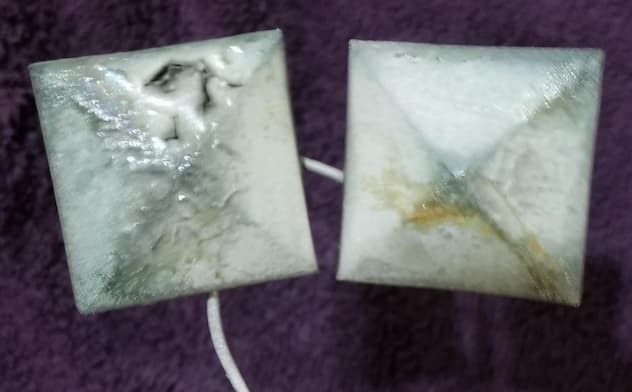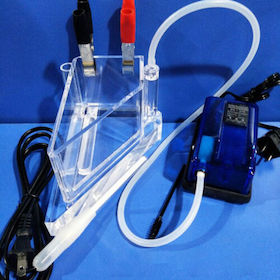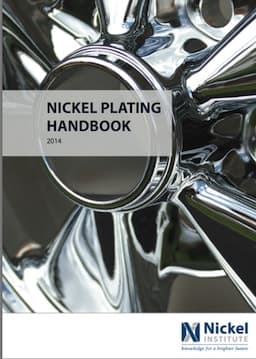
-----
Home nickel plating with vinegar & salt
Hobbyists can try hobby nickel plating ... and vinegar is less dangerous than industrial chemicals. Vinegar & salt is good for school experiments so children can see the concept in action without dangerous chemicals, but it's probably unlikely to turn out well enough to please you or provide any corrosion resistance. Please do your learning on scrap, not on something important to you.
"Real" nickel plating is done with a Watts Nickel plating solution consisting of nickel sulphate, nickel chloride, boric acid, generic or proprietary brighteners & wetters, and sulfurized nickel anodes.
Q. I would like to try to "home" nickel plate the inside of a 100% copper tube heat exchanger for corrosion protection against pool chemicals, like Di-chlor. I was considering using a 5 gallon bucket and pumping the solution through the heat exchanger to accomplish this (assume 3 feet of non conductive hose in and 3 feet of hose out). There shouldn't bee any air gaps, so the fluid should make one continuous electrical circuit. Will high flow inhibit the plating somehow? Or is it better to invert the heat exchanger, fill with solution and center nickel rods in the ends of the open pipe ends? Also, if the copper is soldered, will the plating process compromise the solder joints in any way?
JoeHobbyist at home. Engineer by trade. - Chicago
February 13, 2025
Readers are welcome to browse this site anonymously,
but its main purpose is worldwide camaraderie through sharing
-- so readers desiring that may not engage anonymous posters.
A. Hi Joe.
The plating shouldn't hurt the solder but, if it's older solder with lead, the plating won't adhere to it because the usual acids will not dissolve the lead oxides on it -- and plating needs to go onto raw metal not oxides for proper adhesion.
A bigger issue is that plating occurs in proportion to current density, per Faraday's Law, but electricity takes the path of least resistance so you'll get no plating except at the ends where your anodes are unless you manage to run a cathode wire all the way through the tube. Trying to do useful plating on your first attempt, and a difficult one at that, is bound to be a disappointment.
A basic point is that if you want to learn to electroplate as a hobby, go to it, but work on scrap until you've done significant learning. (If you're truly serious about the art & science, a Hull Cell
⇦ huh?
is the way to learn, and it's an actual tool that professionals use.)
Luck & Regards,

Ted Mooney, P.E. RET
Striving to live Aloha
finishing.com - Pine Beach, New Jersey
Ted is available for instant help
or longer-term assistance.
Q. I tried to make a nickel sulphate solution and failed. I used 1 qt. distilled vinegar
⇦in bulk on
eBay
or
Amazon [affil link] , added salts, put my pure nickel anode and cathode into the solution and ran a current through it until a light green color was achieved. My first two objects I plated were some iron parts for a slot machine. The were scrubbed, degreased and washed in distilled water before being put into the bath. I plated them for about 45 minutes in 400 ml of nickel acetate in a 500 ml beaker [beakers on
eBay
or
Amazon [affil link] at 10V 950 mA. They came out perfect. Bright, smooth and even.
The next three parts I plated (pretreated in the same method) the plating came out darker and darker. The last of the three resembling iron oxide (it was also very hard to polish off) Now the next batch I tried, I thought maybe I had the voltage too high so I dropped it to 5.5v 750ma and it came out even worse. The nickel plating was extremely thick, uneven, gray and peeling back in curls. Though underneath, it appeared to have a thin, bright layer.
Any help would be appreciated greatly!
Here's the final results.

- Ventura, California
August 7, 2020
A. Hi Randall. If you have control over the things you think you do, then the difference between your first run and your third is what you don't have control over: the deterioration of your plating solution. So dispose of your old solution and make it up again or rejuvenate it.
The light green color hopefully means you have some nickel in solution ... but it's very little. Real nickel plating solutions are highly saturated deep emerald green. Your voltage is far higher than that low nickel concentration can sustain. Even 5.5 V is probably too high. I cannot explain satisfactory plating at 10 V in a very dilute nickel plating solution unless it is also low conductivity such that very little current is flowing. I can't compute the current density you used with just the amperage without knowing the surface area.
Luck & Regards,

Ted Mooney, P.E. RET
Striving to live Aloha
finishing.com - Pine Beach, New Jersey
Ted is available for instant help
or longer-term assistance.
Q. I would like to use this method to plate some skewers made of mild steel, would they be food safe after plating?
Thanks,
Retired but still curious - British Columbia
August 4, 2024
A. Hi E.
If well-rinsed, and if the plating adheres (which is not a sure thing), it would be food safe for skewers, although some people have a skin allergy to nickel. But I think you would be happier with stainless steel skewers.
I think it's best to learn plating one step at a time through practice on scrap rather than trying to do functional plating on a food service item out of the gate. Good luck.
Regards,

Ted Mooney, P.E. RET
Striving to live Aloha
finishing.com - Pine Beach, New Jersey
Ted is available for instant help
or longer-term assistance.
Q, A, or Comment on THIS thread -or- Start a NEW Thread


